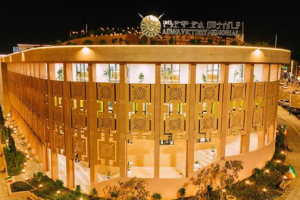BY MULUGETA GUDETA
Hanna was the first child prodigy who displayed her unique talent as a singer many years ago and was discovered by the veteran musician Theodros Makonen alias ‘Teddy Mack’. She was eight or nine at that time and in the subsequent years, Hanna proved her promising talent and saw her career grow and her fame reach millions of admirers and fellow musicians who celebrated her as the fast rising star of Ethiopian singers.
At that age, Hanna sang like a fully matured singer in full control of her melodious voice as she imitated songs previously sang by older vocalists. With Teddy Mack, they formed a duo performing at many concerts.
Regrettably, Hanna’s singing career did not make many strides although her coach said she will reach her peak sooner rather than later. What followed was a decline and now no one speaks about her early promising years. Her decline was as fast as her rise. She did not produce the expected magic with her voice or albums that that sold like cakes and turned her into a young millionaire. She has now completely disappeared from the musical scene. What happened? No one knows. It is however unusual for young artists to rise and fall at the same speed.
Another child musical prodigy has made her appearance this year when the national TV channel of Fana Broadcasting Corporate presented a program featuring the eleven year-old Aklesia Grum in a show program called Fana kelemat or “Fana Colors”. All those who saw and or heard the child play the piano at the show were not only amazed but also agreed that she is a unique talent. Prominent musicians like Dr. Mulatu Astake, dubbed “the father of Ethiopian jazz” admired her skills. And those who know her closely, like her coach Nega Addissu, speak about her with admiration verging on adulation.
Speaking of his young music student, Nega says the following, “Her name is Aklesia Grum and she is my piano student. I taught her the methodology or the elements of music. I have also taught her notation and my own technical innovation as far as melody is concerned. It took me only six months to help her master the skills of playing piano.
I taught her twice a week and what amazes me most is the skill she displayed in mastering the musical keys. What makes her different from other students is the fact that she mastered the techniques I taught her in a very short time and she plays every nota perfectly. She plays perfectly the music we call Tizita, which has its own scale.”
Speaking of the young musician’s academic status and her amazing skills, Nega says his student is only a grade 5 student and she was introduced to music through her father who plays some instruments.
Ato Girum was the main inspiration for his daughter who showed great promise soon after she started learning the techniques of playing musical instruments.
“She is now very good at playing all Ethiopian sounds like Tizita, Ambassel and Anchi Hoye Lene. In my opinion and at her age, she is the one who played the sounds best. I have now started to test her singing skills by teaching her some of the techniques and I hope she will also be as good at singing as at playing the instruments.
“I have given her a new piece of music I wrote for Abay (the Nile river) and I am working with her father in order to develop her skills. She has an amazing dexterity with her fingers when she plays piano. She plays any melody as soon as she listens to it and masters the sounds with amazing speed. She plays Mahamoud Ahmed’s Yeshi Haregitu, Ali Birra’s Awash Nemeshokissa, Telahun’s or any other song, on piano with impressive skills and after mastering the keys in no time.”
Nega also taught her the music scales of many musicians, including those of foreigners. “I taught her how to play one of Mozart’s compositions after I showed her the notation and then she finished playing the nota with wonderful skill. You know that playing Mozart’s music is very difficult but she mastered it with ease. That impressed me very much!”
By the way, it is to be noted that Mozart himself was a child prodigy who played piano concertos at a tender age. What makes Aklesia different from Hanna is that one is a vocalist while the other is a musical instrument player who handles the piano with almost professional ease.
Nega Addisu, her coach is a veteran, but little-known musician, whose career stretch back to the days of the kebele music bands where he started playing the guitar and drums. He performed at the former higher 21, kebele 19 music band and produced his first collection while performing at various venues in the capital Addis Ababa.
He gained confidence with time and went to the music school to learn how to play clarinet while he studied guitar, krar (an Ethiopian string instrument), clarinet and keyboard as well as drums and other instruments on his own or through personal efforts.
Nega’s Addisu’s musical career passed through many stages. He founded his first group called Atrons Band and played with fellow musicians who got their inspirations from Ethiopian musical legends like the late Dr. Tilahun Gessesse and others.
Nega speaks of that stage of his career and his first encounter with Tilahun, the king of Ethiopian vocalists as follows. “When I met Tilahun I felt very happy.” Nega said. “it was a moment of magic and Tilahun admired my skills and encouraged me to work harder in order to attain my full potentials. It was really great!”
Nega Addissu’s career journey was not easy. He struggled against many odds and tried to survive as a musician. He became a self-styled music coach or instructor at a government institution and later on opened a music school near the old cinema house on Churchill Road or Teodros Square. He gathered a number of instructors like Jackson who was coaching dance performance to young and promising talents.
This project was however short lived as Nega could not cover the rent hike his landlady asked to pay at that time. The house rent was raised from 2000 birr to 5000 birr and his meager income could not cover it. He was forced to leave the place and found himself performing at some night clubs where he joined bands as he was playing mainly lead and base guitar.
From that time onwards or in the last thirty years since he became a professional musician, Nega Addissu has composed many pieces of music and struggled to find his own musical voice by trying to create an authentically Ethiopian style he called, “Negat style” or ‘dawn style’ which is derived from his own name Nega meaning “dawns breaks”.
He is still sticking to an ambition that he has been nurturing for the last thirty years. “I wanted to be famous and influential in the domestic music world” Nega says. “I am still fighting for this ideal of mine although it is really hard to achieve one’s life ambition in our society where things are not often conducive to fame and fortune!” According to his story, he could not enjoy the support he needed along the way. Things were rather discouraging for him and luck did not knock at his door quite often.
What is remarkable about Nega is the endurance and tenacity he always displays even when things went from bad to worse. He loves music and there is nothing else he could do other than playing his instruments and creating melodies every time he felt depressed.
“I have never been discouraged and I will never be discouraged!” Said Nega, with his characteristic smile weakly flickering on his aging face. “No way! I’ll never give up hope and I will keep on struggling to the end!” he insisted.
His material condition is not very different from what it used to be for the last thirty years. Yet, he has progressed in terms of music even though he has not yet made his long-awaited breakthrough to fame and fortune. He is still living modestly on incomes he gets from music coaching and occasional stints with performing bands or as a coach to promising talents like Eklesia.
Nega has many instrumental compositions or albums of his own he wrote while he was working with Ambassel music house. He has also replayed or done instrumental compositions of many old Tigrigna songs by the likes of Tekle Desta and Kiros Alemayehu.
He has produced two albums of instrumental compositions. However, he did not have the opportunity to market them as it has become very difficult these days to produce music that can enjoy mass audience as the industry is monopolized by a few established musicians and music companies with a lot of money. It is as if the philosophy of “art for art’s sake” makes sense for the stubborn musician given his difficult financial circumstances.
Nevertheless, this does not seem to have discourage the tenuous, dedicated and hard working Nega to keep on trying, composing and playing music as this is the one passion that helped him survives many odds and gave him hope in the future at the same time. But how and when his ordeals will end remains an open question even for Nega himself.
In the meantime, Nega is on the lookout for young and promising talents whom he is willing to coach and help them realize their potentials. This is no small contribution because coaching the stars of the future is requires tremendous commitment and love of the profession. Aklesia must be lucky to be trained by him and others will inevitably follow as there are many promising young musicians in Ethiopia whose stars who struggle in the shadow of anonymity for lack of a dedicated trainer like Nega.
The Ethiopian Herald January 23/2021





